It is not always a simple task to bat, bowl and field equally well and especially these days when high fitness levels are demanded due to excessive cricket played. This piece pays homage to those players who have won matches for their nations with their multi-faceted abilities in the history of the game.
1) Keith Miller (Australia)
Born in 1919, Keith Miller was perhaps the first ‘original’ all-rounder cricket could possess after the Second World War. He could turn a match around single-handedly for Australia with an attacking innings while batting or a fiery spell of fast bowling. Sir Don Bradman’s ‘1948 invincibles’ needed someone like Miller to prove to be the difference between his team and the others.
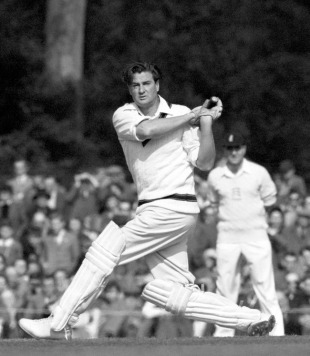
And he did not disappoint the team as he ended with 170 Test wickets at a miserly average of 22.97. He could bowl almost any ball, even the leg-spinner with his usual run-up.
In terms of his batting career, he scored 2958 runs at an average of 36.97 which is impressive for an all-rounder in those days. 4 of his hundreds came against the upcoming West Indies and in an ultimate tribute to Miller, the Windies captain John Goddard said ‘Give us Keith Miller and we’d beat the world.’ While the once Prime Minister of Australia, Robert Menzies kept a photograph of Miller playing a text-book square drive for years in his desk.
He had his personal problems with Bradman which was probably the reason he could not flourish under his stewardship completely and was not a great leader by any means. However, that did not stop him from setting an example for other all-rounders to be born and by the time he expired in 2004, Australia had lost a living legend.
2) Garfield Sobers (West Indies)
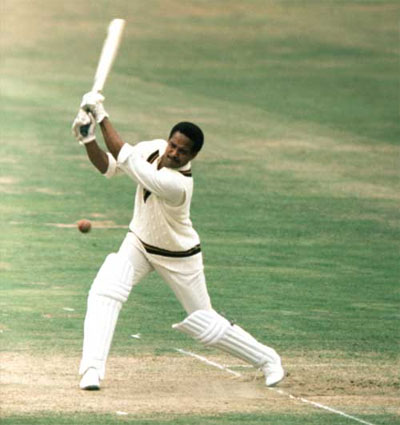
The now 75-year old West Indian was knighted in 1975 by Queen Elizabeth II in England due to his services to the game of cricket. And why not? He had a batting average of 57.78 as in 93 Tests, he scored 8032 runs. While his bowling average was also decent, 34.03 as he picked 235 wickets in his career. It shows the man’s consistency to win matches for his country with both bat and ball, and this is why Sobers is actually the man considered to have bought out ‘all-round’ skills in cricketers of other generations to follow.
In his early days, precisely from the period of 1954 to 1957, as a batsman Sobers managed to get fifties but frustratingly could not convert it into hundreds. However, since 1957, he was able to do so at an alarmingly consistent rate. And one of his first hundreds was a once world-record score of 365 against Pakistan at Jamaica in 1958 where he batted for 10 hours. Fittingly, it was Brian Lara who broke that record 36 years later at Antigua against England.
He was a more of a batting all-rounder and an average of three wickets per game is a testament to this statement. However, he had a decent record as captain of the West Indies from the period of 1965-72 where his team beat the likes of Australia (for the first time), England and India in their own backyard. He played his last international game in 1974, ending a long career spanning exactly 20 years. Only Sachin Tendulkar has played for a longer duration.
In his honour, the ICC not only lists him in their ‘Hall of Fame’ but also has named their Player of the Year Trophy after him and this is given to the most outstanding player across the world in a calendar year with some recipients being legends such as Ricky Ponting and Rahul Dravid.
3) Richard Hadlee (New Zealand)
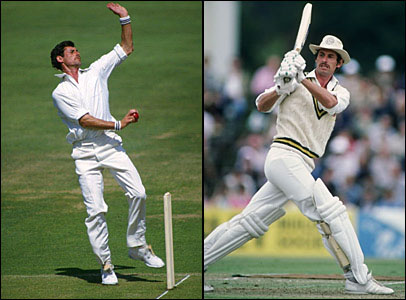
Alongside his all-round counterparts such as Ian Botham, Kapil Dev and Imran Khan, he is considered as one of the greatest all-rounders of the game and especially in the period of 1980s when the game of cricket was undergoing massive change. It is this man who is accountable to elevate New Zealand’s status as one of the top teams in world cricket over the years, despite his country having a huge disadvantage of a less population and so a very low quantity of talent.
He was the first player to reach the 400 wicket mark in Tests and that was because of his incredible knack of regularly extracting rapid pace as well as good carry from the ball despite bowling with a short run-up and a side-on action. His first five years were inauspicious but he was fortunately persevered with and he made an impact in 1978 when he took a 10-wicket haul against England and incidentally this was New Zealand’s inaugural Test win against the Poms. Besides, he played a key role in promoting the Trans-Tasman with exceptional performances against Australia and he will never be forgotten for a match-winning 15-wicket haul at The Gabba in the 1985-86 season. He signed off in grand fashion by picking a wicket in the last ball of his career, in 1990 and still being in the best of forms.
Although he was essentially a bowling all-rounder, he was no pushover with the bat as he did have 3124 runs in his kitty with his highest score being an unbeaten 151 and his lusty blows lower down the order were sometimes crucial for New Zealand, especially in the ODI game. The ICC added him in their Hall of Fame as late as 2009 and New Zealand’s best player of the year receives a medal named after him.
4) Ian Botham (England)
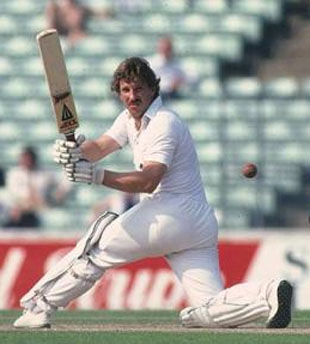
He will be disrespected by many for taking cannabis or having an extra-marital affair but his achievements in cricket will always make him command respect. His rise in international cricket was unbelievable. Within an year of playing for Somerset, he made his debut for England in 1977. And in the following three years, he was named the captain of his country.
Botham had a brief hiccup in his career initially, when he was captain as England had lost eight and drawn four Tests out of twelve in a period of one year. But the moment he relinquished the job and was succeeded by Mike Brearley, England’s and his fortunes changed dramatically.
England went on to win the 1981 Ashes series at home after being 0-1 down in the first two Tests and following-on in the third Test. It is correctly named ‘Botham’s Ashes’ by cricketing pundits since Botham turned it around for his nation with a blistering 149 not out in the second innings of the third Test and picking up 7 wickets in the Test altogether. While in the following Test, Australia needed 151 runs to win the match but he picked 5 wickets of 1 run in the innings as England were 2-1 up all of a sudden with two to play. He scored another ton in the next Test at the Oval and the sixes off the bowling of Dennis Lillee were hit with immaculate power ending up with a 158. In the last Test match, he picked up 6 Aussie wickets in the first innings to hold them to a draw as England won the series 3-1 and Botham won the man-of-the-series award for scoring 399 runs and picking 34 wickets.
However, name and fame got onto him as his performances were not so consistent after that even as he helped England win the Ashes again in 1986 but this was in Australia under the captaincy of Mike Gatting. He somehow survived till 1992 due to his equal batting and bowling attributes and will remain one of England’s best all-rounders ever.
5) Kapil Dev (India)
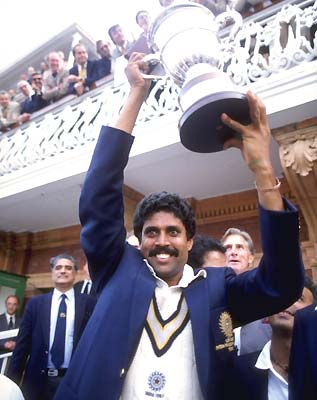
He will always be renowned as India’s first World Cup winning captain. He will always be felicitated to have led a ‘David’ Indian team to world glory in 1983 after outsmarting the defending champions and a ‘Goliath’ West Indies in the World Cup final at Lords. Besides, he is the country’s greatest all-rounder ever as well. ‘There was a Kapil Dev, where comes another?’ describes his stature perfectly.
He eventually ended with 434 wickets to his name, which was easily a world record until Courtney Walsh broke it. He belongs to the rare breed of cricketers to have scored more than 5000 Test runs and picked more than 400 Test wickets. When he batted, he knew how to give the ball a perfect pounding and Zimbabwe got to see that live in the 1983 World Cup when he smashed 175 not out, another world record Kapil achieved.. And when he bowled, he knew best how to shatter the stumps of a batsman and bowl outswingers to right-handers. As a fielder, he was spectacular as he took one of the most memorable catches in the history of cricket, that off Viv Richards in that glorious ’83 final.
He even has hit one of the fastest centuries of Test cricket of all time and his fitness was tremendous that he played 131 Tests on the trot until he was banned for playing an attacking stroke at a wrong time in a Test match against England. He went on to coach India for a period of time until he resigned, due to the match fixing controversy which arose in 2000. But he went on create the rebel Indian Cricket League (ICL) which was a failed venture. Yet, Kapil made Indian cricket dynamic in its approach and no Indian fan will ever forget his contributions.
6) Imran Khan (Pakistan)
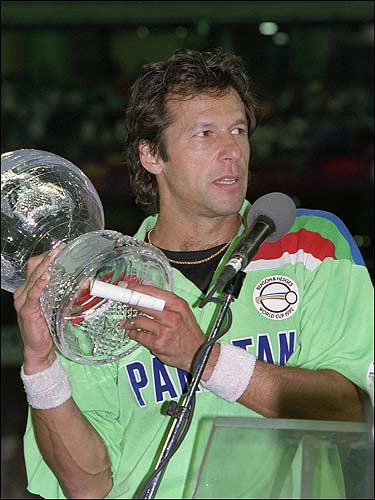
What Kapil is for India, Imran is for Pakistan. Both of them were fabulous all-rounders and legends of the game, leading their teams to World Cup glory. Though Imran achieved the feat in 1992, and resigned the very same day from international cricket. It was a fitting farewell for an outstanding cricketer.
Pakistan rarely produces cricketers who are all-rounders and have well-groomed personalities. Imran Khan is one of those exceptions. He started out as an all-out fast bowler but gradually realize that he can use swing and movement as his weapons rather than his pace to conserve his energy and hence became more destructive. While as captain, he actually resigned twice because of the team he was getting was lead was non-committal in their approach. And he always backed his players to perform, especially under pressure. He is one of those unselfish cricketers that you do not get to see these days as he has ended careers of those players who are individualistic rather than team players.
Towards the end of his career, Imran became more of a batting all-rounder and so batted at No.3 in ODIs in particular. Only a cricketer of his skill can convert so quickly and successfully. Pakistan may have produced greats such as Javed Miandad, Wasim Akram and Waqar Younis. But if there is any revered player from the country that the whole world has etched in their minds till date, it is Imran Khan. He now is a politician and is the founder and president of his party, ‘Tehrik-e-Insaaf’ which is aiming to bring about stability and prosperity in Pakistan.
7) Jacques Kallis (South Africa)
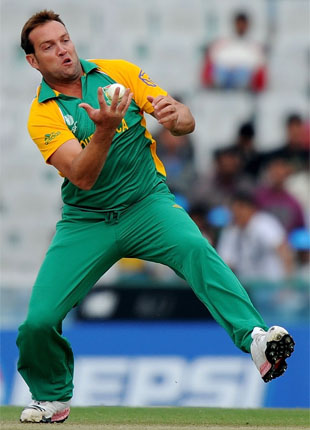
The South African veteran will certainly go down as the finest all-rounder to have ever played cricket, by the time he hangs up his boots. The best part of all, is that he is 36 and still having the hunger to play the game, as seen with his recent double century against Sri Lanka which is his second in 2 years and his highest Tests score till date!
His achievements testify that the Cape Town man has had the consistency to not just survive, but perform outstandingly in all formats of the game being multi-faceted. Having scored over 12,000 runs in Tests and picked 271 wickets as well as scored over 11,000 runs in ODIS and picked 267 wickets in ODIs gives him a spot in the all time XI of both ODIS and Tests easily and if not as an all-rounder, atleast as a batsman.
His humility and determination in achieving his goals has made him a stand out performer for his country in the last 16 years. He made his Test and ODI debuts for South Africa in the 1995-96 season against England as a young 21 year old but within 2 years, he had cemented the No.3 spot in the batting line-up.
He has a golden arm and the captain can always turn to him whenever the team is in trouble and needs a wicket desperately. There has been no major slump of form for Kallis in his career as yet and that is due to his overall well-being. He is largely responsible for taking South Africa to the top of world cricket in the 2000s as per the rankings.
He is the contemporary yet classical cricketer and his illustrious career celebrates the evolution of the game, being one of the few ‘evergreen’ all-rounders to have taken the field.
8) Shaun Pollock (South Africa)
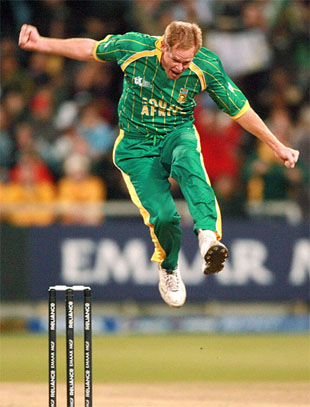
Another Protean makes this list. He was brought into the South African Test side against Michael Atherton’s England in 1995/96 and although his father Peter Pollock was the convener of selectors, there was never a hint of favoritism as Pollock proved his worth from time to time.
He went on to form one of the finest new-ball partnerships in world cricket with the ‘White Lightening’ Allan Donald. While Donald had buckets of pace, Pollock had this ability to bowl with such accuracy that his line and length would prove to be nagging for even the best of batters. He also had a great amount of energy and bravery as he once bowled continuously for 60 minutes in one Test in Australia, trying to pick a wicket but without any success.
It is no wonder that he ended with 393 ODI wickets and 421 Test wickets as he was like McGrath, not relying much on his pace and as a result thriving in all conditions. He was captain of the South African side for close to 3 years and that helped him improve his batting skills as he has scored above 3000 runs in both forms of the game.
He called it a day in the beginning of 2008, after he realized that he was at his best but could fall if he continued playing for long. Now, he is the coach of the Mumbai Indians in the IPL alongside his South African teammate, Jonty Rhodes.
9) Sanath Jayasuriya (Sri Lanka)
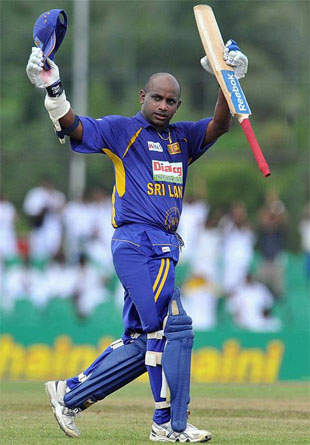
The Matara mauler innovated batting in ODI cricket by going over the top in the first 15 overs of batting, which were overs allotted to the fielding restrictions in those days. A talented opening partner in Romesh Kaluwithrana was perfect for him to enjoy his batting and scores heaps of runs at a gigantic strike-rate. That made Sri Lanka win the 1996 World Cup and extended Arjuna Ranatunga’s captaincy stint for another three years.
Jayasuriya was unbelievably a bowler in the initial part of his career but he gradually focused on his batting to become a batting all-rounder which his team needed him to be. He will always be remembered for his powerful cut shots and crunchy off-side shots which made him so dangerous to his opponents. With the ball too, he could do a lot not just a bit and that has been seen so many times. A few remember now, but Jayasuriya was the man who got the wicket of the maestro Sachin Tendulkar in that fateful 1996 World Cup semifinal in Kolkata with the ball spinning away from Sachin.
He was not as prolific in Tests with close to 7000 runs and 100 wickets to his name. But in the shorter format, he was one of the very best of his generation as scoring over 13000 runs and picking over 300 scalps is amazing. As captain, Jayasuriya had an average run despite taking Sri Lanka to the World Cup semifinal in 2003 in South Africa and prior to that, the Champions Trophy final at home in 2002.
However, as a batsman age caught up with Sanath and he eventually had to quit all forms of the game last year. He now is a Member of the Parliament in Sri Lanka and a noted commentator but will always remain Sri Lanka’s most influential cricketer of all time.
10) Andrew Flintoff (England)
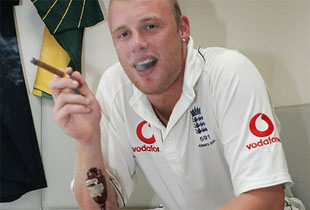
‘Freddie’ as he is affectionately called will be a flawed genius when it comes to playing cricket. He is one of the classic examples of talent vs. attitude, and Flintoff was an extreme case of a player relying on his talent to deliver the goods every time. He did for a period of time but after that, it proved to be ineffective. Much like Ian Botham, isn’t it?
If Botham was the central figure of England’s 1981 Ashes win, Freddie was the central figure in England’s 2005 Ashes win. He started off poorly at Lords but produced a fighting fifty and one stunning over of bowling in the second innings that got the wickets of Justin Langer and Ricky Ponting. It was stuff of the folklore as it is considered one of the best overs ever bowled in Test cricket. England went on to win a cliff-hanger by 2 runs and Australia’s confidence was dented. A century at Trent Bridge was another match-winning effort as he was unstoppable. He was undoubtedly declared the man-of-the-series alongside the great Shane Warne and the toast of the nation, which had to wait 19 years for success in an Ashes series.
Prior to this, Flintoff was establishing himself as England’s numero uno allrounder having a slow start to his career. He was dropped several times and was injured and only made it regularly into the playing XI from the World Cup 2003. 2004 began his steady rise as he performed excellently against the West Indies both away and at home and against New Zealand at home. He also had a good tour to South Africa being one of the major strike bowlers for Michael Vaughan and a vital batter at No.6.
Post-Ashes and his slump began. He was made captain for the tour of India in 2006 and though his captaincy was inspirational in a 1-1 draw, he was not himself as he struggled to realize the value he has as an all-rounder in the team and consequently experimented too much. Like most all-rounders, he was never successful as captain. A few months later, and he was at the helm when England were whitewashed 0-5 in Australia and the Ashes went back Down Under. Freddie did not seem to return to his elements and learn from his failures as he was a part of a stunning controversy involving boozing in the Caribbean during the World Cup and it is now revealed that he was suffering from a kind of a depression.
Injuries had the upper hand in his career as he struggled to play continuously for England and it took the team a while to live life without him as he somehow remained central in their plan for the future. But when he performed, he did with his heart out as seen in the Ashes 2009 which was incidentally his last Test series before retiring from the game altogether. His five-wicket haul at Lords won England a Test there after 75 years and gave them a 1-0 lead and his sharp accuracy ran out Ricky Ponting in the final Test at the Oval, which made England win back the Ashes again by a margin of 2-1.



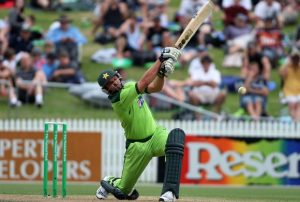
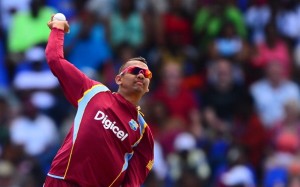
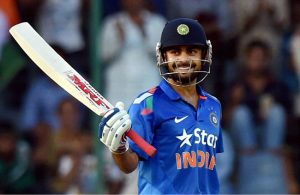
Leave a Reply